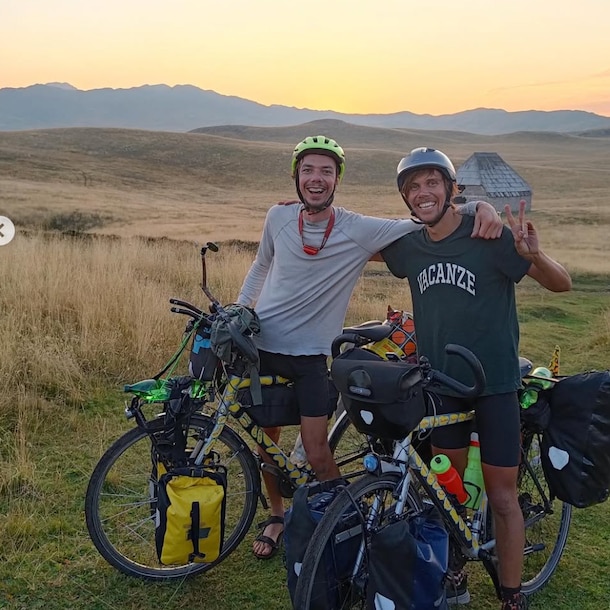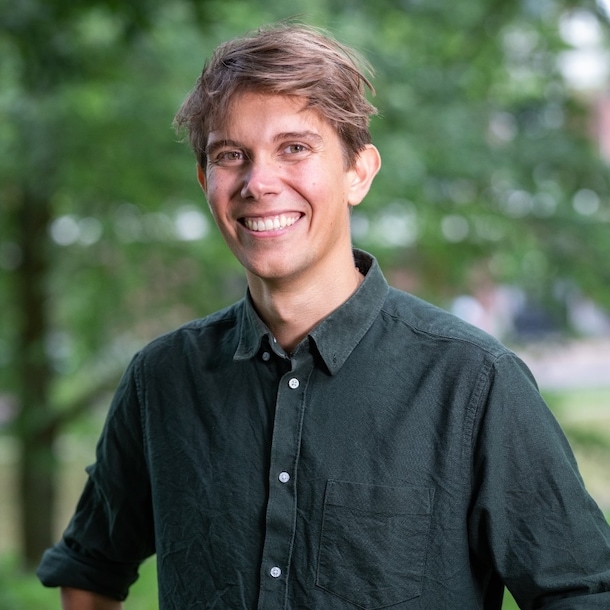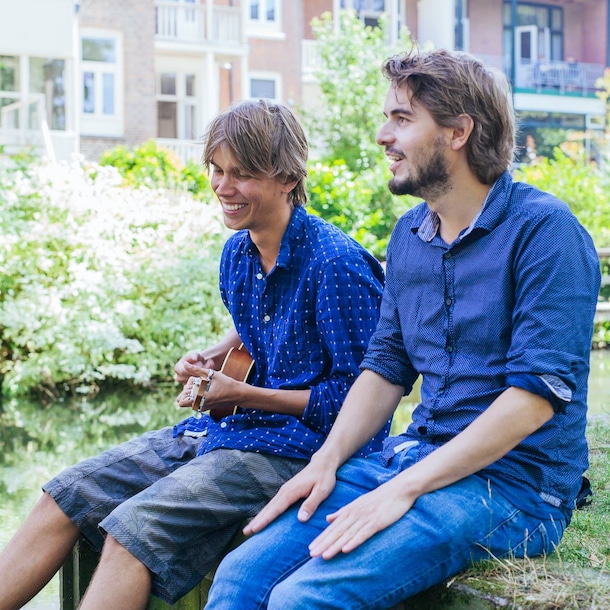From The Hague to Istanbul: psychologist Merijn searched for happiness while cycling – and found it

"Happiness lies in the smallest things," says Merijn. "But especially in connecting." He knows this from experience. Since his studies, he's been experimenting to find happiness. For example, he used all his savings to do something that made him happy every day for a year, without worrying about money. So he wasn't looking for the perfect job, but for the secret to a happy life. "I'm convinced it's all about connecting, about being able to make a difference for someone else."
No perfect momentHis ultimate moment of happiness occurred during a bike ride with his best friend Loek. Without a plan or preparation, the men cycled to Istanbul two years ago. "We'd talked about it for years, but there was never a perfect time to leave. So, one summer evening on a terrace in The Hague, we decided to just go." He wrote a book about this journey and combines it with small lessons for a happier life.
It turned into an adventurous journey full of bizarre experiences. But that wasn't the true happiness, as Merijn found out, for example, after everything went wrong. Merijn and Loek were cycling in Greece and had arranged with people they met along the way to meet up later. For fun, they added a competitive element: the first to arrive wins. But during their journey, they were hit head-on by a car, and Merijn was taken away in an ambulance.

Because of that accident, we didn't show up at the agreed-upon location and got separated. Later, we found each other again by pure chance. When we were all having a few drinks together, I felt it: happiness. I was on vacation with my best friend and we were having the greatest adventures. I was healthy, except for a broken wrist, and how coincidental was it that we saw our friends again?
That connection with each other made Merijn happy. "That's also supported by several scientific studies," says Merijn. "It's difficult to define happiness. It's measured by questionnaires: how happy are you on a scale of 1 to 10? But a questionnaire is always a subjective experience: everyone experiences it differently. I stick to the formula: happiness is a feeling of contentment + meaning in your life as a whole + the degree of positive emotions you experience from day to day."
Working on happinessThere's no single formula for achieving that, but you can certainly work towards a happy life, he says. "A well-known exercise is to look at what's going well. People who write down what they're grateful for every day report feeling happier after a while. It affects their relationships, they sleep better, and their physical health improves. Stress and anxiety also decrease. So, at the end of the day, think of three things you did well. For example, you took the bike instead of the car, complimented a stranger, or cooked for someone. Writing this down motivates you to do something similar the next day, even if you might not feel like it."

Another effective strategy is exercise. "It might seem obvious, but exercise releases all sorts of happiness hormones like endorphins, dopamine, and serotonin. Research even shows that exercise is more effective than antidepressants in the long run for people with mild depression. For those who have trouble getting started, I recommend the two-minute rule: make big things very small. Just put on your running shoes or roll out the yoga mat. Getting started is the hardest part. But once you get going, you might as well keep going."
Influence of genesThe recipe for finding happiness sounds quite simple, but unfortunately, it's not for everyone. "A person's happiness is largely determined by our environment, but also by our genetic variants. For example, one person is more sensitive to setbacks than another. This can influence how you react when stuck in traffic: one person gets angry and frustrated, another sings along to the radio at the top of their lungs. The predisposition for depression is also partly genetic. For people who suffer from this, it's more difficult to achieve the same sense of happiness as for people who don't have this genetic variant."
There is no greater happiness than connection
The definition of happiness also varies by country. "That's why it's so difficult to measure. We in the West have hit the jackpot when it comes to well-being and security. People who are dealing with war, corruption, or large income gaps between rich and poor have a different definition of happiness. For them, it might be finding stability and resilience, for example."
Varies per countryThe World Happiness Report examines the difference in happiness perception between countries. The Netherlands scores high on the happiness ladder, but our country also has a high loneliness rate. 48.5 percent of our compatriots say they sometimes feel lonely. "That's why I believe so strongly in connection. Happiness isn't about material things, but about genuine connection with others. And that immediately presents a major challenge when so many people feel lonely."
That's why Merijn is a big fan of chatting with strangers. "It's as simple as asking how someone's day is. I do that regularly. Recently, there was a man sitting next to me on the train who was covered in tattoos. He even had a spider on his forehead, and I actually didn't dare talk to him. Also because he had earbuds in and probably didn't want to be disturbed."

I hesitated for ten minutes. Only when I'd gathered enough courage did I say, "Hi, I'm curious to hear your story." We chatted the entire way about work, dreams, everything. The people in front of us joined in the conversation. After we got off the train, we shook hands. This conversation made the journey very pleasant, and that makes me truly happy.
Friendliness InternationalYet Merijn also notices a lot of reluctance from others to approach strangers. "During the bike ride, people told us: 'Be careful, you can't trust them across the border.' And that border was always a different country. But wherever we went, we always found a place to pitch our tent."
In his notebook, Merijn not only recorded the route, but also all the moments of kindness. "I came up with 190. 190 times strangers opened their homes, their food, their hearts to us."
Although things did go wrong sometimes. When he asked for a place to sleep in Bosnia, he ended up in a roadside garden. It was dark, close to a road, and not the ideal spot for a tent. To make matters worse, the hospitable man got into a heated argument with his wife after offering the boys the place.
Helpers highThe boys decided to continue cycling in the dark. It got later and later. Finally, Merijn saw people sitting on a balcony. He called up: "Hey, can we sleep here?" It was a last-ditch effort. The housemates looked at the two tired cyclists, conferred briefly, and then let them in. "Before I shouted up, everything in me said: this is a bad idea. But they adopted us. What a blessing."
"You'll be amazed at how much people enjoy helping others," Merijn continues. "It literally makes you happier. When we do something for someone else, we release chemicals that make us happier. As humans, we're literally 'programmed' to feel good about helping others. This effect is known as the helper's high. Even the smallest thing—a compliment, a euro for a street musician, a chat—can make all the difference. So no more excuses, send that message to that friend you haven't spoken to in months, invite your neighbor over for tea. Do it. Really. Because there's no greater happiness than connection."
Click here for moreLifestyle
RTL Nieuws

%3Aformat(jpeg)%3Abackground_color(fff)%2Fhttps%253A%252F%252Fwww.metronieuws.nl%252Fwp-content%252Fuploads%252F2025%252F06%252Fpexels-jakubzerdzicki-28763701.jpg&w=3840&q=100)
%3Aformat(jpeg)%3Abackground_color(fff)%2Fhttps%253A%252F%252Fwww.metronieuws.nl%252Fwp-content%252Fuploads%252F2024%252F08%252FANP-423986868-1.jpg&w=3840&q=100)
%3Aformat(jpeg)%3Abackground_color(fff)%2Fhttps%253A%252F%252Fwww.metronieuws.nl%252Fwp-content%252Fuploads%252F2025%252F08%252Frechters-rechtstaat-rechterlijke-macht.jpg&w=3840&q=100)
%3Aformat(jpeg)%3Abackground_color(fff)%2Fhttps%253A%252F%252Fwww.metronieuws.nl%252Fwp-content%252Fuploads%252F2025%252F07%252FANP-494130618.jpg&w=3840&q=100)
